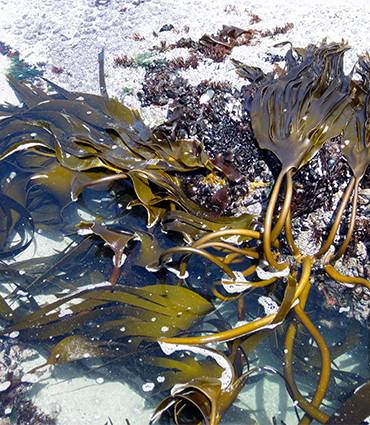
ECKLONIA BICYCLIS

Latin name:
Ecklonia bicyclis
Common name:
Aramé
Family:
Lessoniacées
Origin:
Korea, Japan, China
Part of the plant used :
Whole algae
Description
Ecklonia bicyclis, also known as "Aramaic", is a brown seaweed that has been consumed for centuries in Asia.
It has antioxidant properties, thanks in particular to its richness in marine polyphenols: phlorotanins. These molecules trap free radicals, thus making it possible to fight against oxidative stress in the cells.
The effectiveness of phlorotanins on health is due to several parameters: their structure and their half-life time (the time after which 50% of the molecules are degraded).
The half-life time of Aramaic polyphenols (12 hours) is 24 times higher than that of terrestrial polyphenols (about 30 minutes).The antioxidant action of phlorotanins is therefore long.
In addition, tannins are made up of cyclic rings. The more a molecule contains, the more effective its antioxidant activity is. Thus, while the resveratrol of the wine has 2, the compounds of Ecklonia bicyclis have 32!
The antioxidant power of Aramaic is therefore surprising.
Moreover, the phlorotanins in this algae are capable of crossing the blood-brain barrier. This means that the protective effect reaches even into the brain cells, a capacity that is not available in antioxidants from terrestrial plants.
Aramaic also has antibacterial and anti-inflammatory properties.
The benefits
- Aramaic, a brown seaweed, is an antioxidant.
- Combined with other compounds such as glucosamine, ginseng, tribulus or nettle, Ecklonia bicyclis can help improve erectile function. It contributes to the maintenance of good sexual relations, the health of the reproductive organs and the proper functioning of the urinary system in men over 45 years of age.










